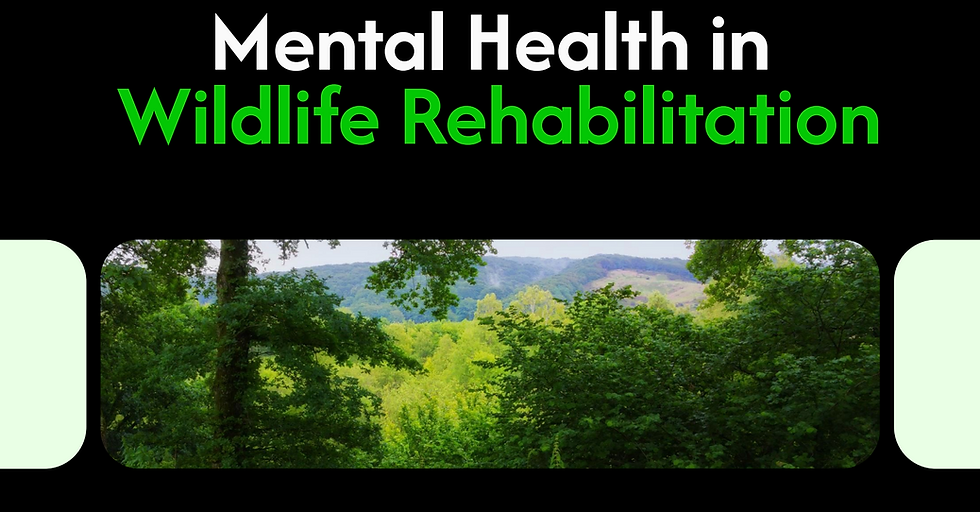The Need for a More Sustainable Model for the Rehabilitation of Wildlife
- May 3, 2021
- 3 min read
Nelson reporter Samantha Gee's recent article highlighted the demand for more rehabilitators in Nelson. While two rehabilitators work tirelessly, their resources cannot extend to all the wildlife in need with little support or funding. This story reflects the reality of most regions throughout New Zealand.

Samantha contacted WReNNZ (The Wildlife Rehabilitators Network of New Zealand), and I was pleased to talk to her about the challenges faced by our network. One of the challenges of being a rehabilitator is that the more the rehabilitator becomes known, the more sick and injured birds get brought in by the public! This poses a personal health risk for our members, who end up being worked off their feet trying to respond to the increasing workload. Burnout and emotional fatigue is a real risk in this situation, even without the additional financial burden of funding the care of the wildlife.
Our members rely almost entirely on donations and their own funds, and most have built up strong relationships with their local vets who assist as much as they can, but there is a limit to how much pro-bono work a local vet can sustain.
Some members operate a closed relationship with DOC and their local vets to manage their workload better by being closed to the public.
Nelson is one of the areas where this is the case, and the rehab centres are not widely known by the public but are well known by vets and the local DOC teams.

WReNNZ is actively trying to support our members by working with DOC, Massey University, Zoos and the larger animal hospitals like New Zealand Bird Rescue, the South Island Wildlife Hospital and the Dunedin Wildlife Hospital, to develop a sustainable model for having more rehabbers across the country, supporting the main rehab centres of excellence. The idea is that if we can have more well-trained rehabbers doing a little, rather than a few doing a lot, this will lead to a more sustainable rehab network. The model will also allow rehabbers to specialise in specific species so that rehabilitating wildlife is easier and more focussed, rather than treating multiple species with the challenges of separate housing and food sources.

Establishing a more expansive network is no easy feat. WReNNZ has engaged with WIRES (the New South Wales Wildlife Information, Rescue and Education Service Inc.), Australia's largest wildlife rescue organisation, to see how that organisation developed over 30 years. WIRES began in 1985 in response to a glaring need for a native wildlife rescue service. At the time, no organisation, government or conservation group could take specific responsibility for native animal rescue and care. WIRES quickly established a coordinated network of wildlife carers and rescuers and officially launched as an organisation in March 1986.
WIRES rescues and cares for wildlife under a license issued by NSW National Parks and Wildlife Service, and WIRES Rescue Office can be reached 365 days a year by calling 1300 094 737. WIRES receives minimal government funding through grants, and no funding is guaranteed, which is why it is reliant on the community's generosity for over 95% of its funding.
There are similar parallels between WReNNZ and the formation of WIRES. WReNNZ is committed to finding a better way for our members to help with wildlife rehabilitation sustainably. We believe that there needs to be much more publicity of the extraordinary work being done by rehabbers in supporting DOC in preserving our native wildlife, which in many cases is critically endangered.

Without the tireless efforts of many of our members, New Zealand's wildlife would be in a more precarious situation – for example, the Yellow-Eyed Penguins. So any story in the media that raises the profile of our members is to be welcomed! Our rehabbers need to be supported and recognised for the work they do.
We look forward to the day the Government provides funding to rehabilitators, recognising the vital role they play in the lives of our wildlife and communities.
It is humbling to work with our members across New Zealand and see their work rehabilitating our wildlife with limited resources and unlimited passion and tenacity to make a difference. It is time they were celebrated and recognised for the work they do!
Brian Robertson
Chair of WReNNZ
Initial article written by Samantha Gee - http://www.stuff.co.nz/environment/124328805/warmer-sea-temperatures-making-it-tough-for-juvenile-shags






Comments